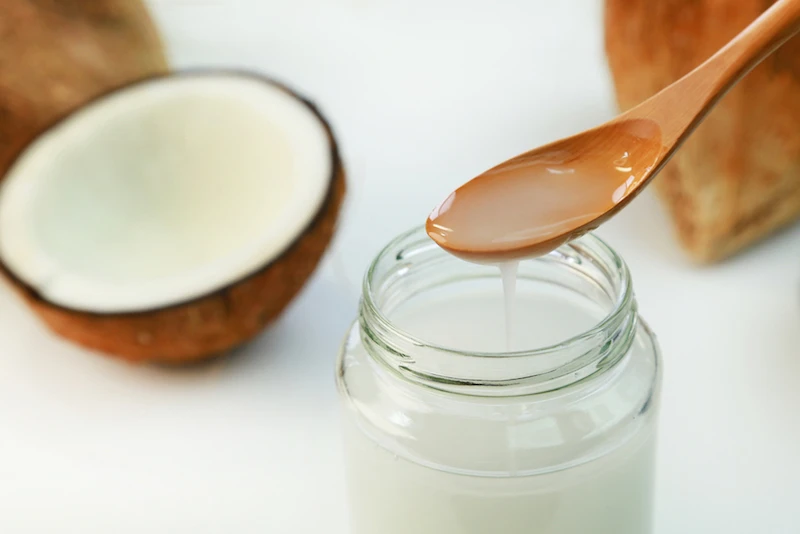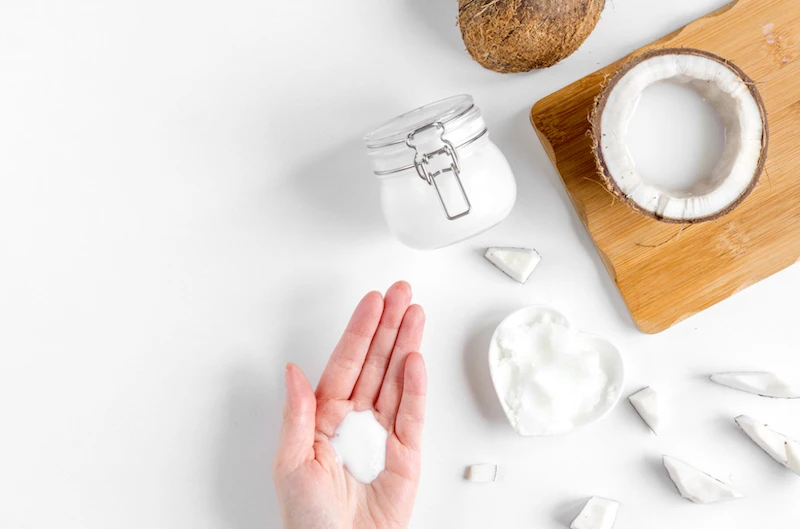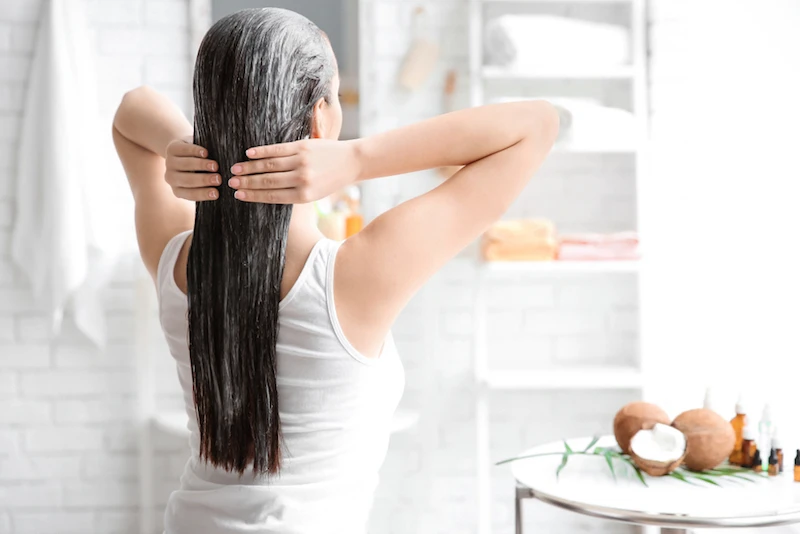Should you use coconut oil for your hair?

September 14, 2018

Coconut has been in the limelight for awhile now, with many health-conscious households keeping at least some form of this versatile fruit in their pantries.Jump to:
While it’s obviously very popular as an ingredient in cooking, did you know that coconut oil can also be used as a natural beauty product? In fact, many people swear by its benefits and the way that it makes their skin and hair feel.
Is coconut oil good for your hair?
Studies have found that using coconut oil on your hair can have a range of potential health benefits for your tresses and scalp. Coconut oil refers to the oil that is extracted from the flesh of the coconut and, when used as a hair treatment method either before or after washing, has shown to reduce protein loss from hair (the thing that causes dryness and hair breakage). As coconut oil is rich in fatty acids, it is able to penetrate the hair deeply, compared to other products and oils.
Benefits of coconut oil for hair
Coconut oil may benefit your hair in a range of ways:
It may reduce protein loss in hair
It may be used to treat dandruff
It may assist in hair growth
It may work as a natural leave-in conditioner
It can be used as a hair product to prevent frizz and flyaways.
One thing to keep in mind though is that coconut oil doesn’t actually moisturise the hair, despite this being something that many people believe — in fact, no oil does. Instead, it seals the top layer of hair, helping to protect it against damage, which is why your hair feels so smooth after using it as a treatment. This sealing effect can help protect the hair from combing and thermal damage. It can also provide protection from products containing chemicals that strip the hair of its natural oils.
While using coconut oil can sometimes be positive, it may not provide the same benefits to all hair types.
How to use coconut oil for hair
Applying coconut oil as a hair treatment for your hair is simple and quick — it’s no wonder that it’s a natural favourite for many women. Just follow these easy steps and you’ll be on your way to healthy (and beautiful smelling!) hair.
Coconut oil as a hair treatment
A natural treatment like coconut oil means you know exactly what ingredient is being absorbed by your body. Coconut oil is all-natural and usually avoids many of the hidden nasties that can be a concern for those with sensitive skin, unlike some store-bought leave-in conditioners. Purchasing extra-virgin coconut oil can be a safeguard against this.
Whether you apply coconut oil to damp or dry hair is up to you, although it will probably be easier to spread the oil through damp hair following a shower. Prior to using coconut oil as a treatment, make sure there is no other product in your hair.
The amount of coconut oil that you use will depend on your hair length and type of hair. If you have shoulder-length hair, use around 2 teaspoons of coconut oil — use less for short locks or thin hair, and more for thick/long hair.

Step 1. Prepare the coconut oil
To use coconut oil as a hair treatment, it works best when it is a soft, almost liquid form. Depending on your climate, this might already be the case when you buy it (the warmer the weather, the more liquified it is). If it is in solid form, you can just spoon out a small amount, then rub it between your hands to warm it up. An added benefit of this method? It softens your hands and can help them to feel great too!
If you need to soften the coconut oil further, try placing a few teaspoons of coconut oil in a small bowl and resting that bowl in a larger bowl filled with hot water. This helps melt the oil from a solid.
Another method is to microwave it for a few seconds. If you choose to do this, be really careful not to overheat the oil — it’s really easy to overheat it unintentionally. The last thing you want to do is apply hot coconut oil to your scalp!

Step 2. Use your hands to work it through your hair
Once the oil is softened, rub it between your hands. The application method you use will depend on what your hair goal is.
If your goal is: hair growth or to remove dandruff
If you are using the coconut oil to treat your scalp, then be sure to massage it all the way through, from your roots to your tips. Gently massage it into your scalp to help stimulate circulation — this can help promote healthy hair growth.
Massage the oil into your hair for 5-10 minutes. You could even try convincing a loved one to give you a head massage!
If your goal is: hair shine
If you tend to get an oily scalp or have sensitive skin, it is probably best to avoid using coconut oil as a scalp treatment. Instead, take the prepared coconut oil and apply it from your mid-lengths down to the ends of your hair.

Step 3. Place your hair up and let it work its magic
Clip your hair up or tie it up with an elastic and then place a shower cap over your head to make sure that the coconut oil doesn’t go everywhere! Leave it on for at least 30 minutes.
While some people like to sleep with it in their hair overnight, if you are using coconut oil for the first time then it’s probably safest to leave it on for half an hour, then see how your hair reacts to it.
If you want to sleep with it in your hair, rest your head on an old pillow case as a way to avoid any stains!
Coconut oil to tame frizz
If you plan to use coconut oil to tame frizz, only use a very small amount. Otherwise your hair will just appear oily!
If you want to use coconut oil to tame frizz and as a protectant, simply rub a small amount between your hands to warm it up and then apply it through the ends of your dried and styled hair.
Can coconut oil damage my hair?
It’s important to remember that each person’s hair reacts differently to oils, so although many people have experienced positive results from using coconut oil for hair growth and health, ultimately it’s best to do your research before you begin. Some people have experienced negative results with their hair becoming more brittle and dry.
If you have dry, brittle, stiff or coarse hair, then this might not be for you.
The reason for this is because, as mentioned above, coconut oil acts as a sealant — it creates a protective layer on the outside of the hair. Coconut oil can reduce protein loss from hair, which effectively means that it can cause a protein build up for some hair types. Because coconut oil does not moisturise the hair, this then means that for hair types that require a lot of moisture, the build up of protein on the outside layer of hair can actually block moisture from penetrating the strands — resulting in drier hair that can be more prone to breakage and damage.
Is coconut oil suitable for my hair?
Everybody’s hair is different. That’s why it is so important to see how you go the first few times — if you experience any sort of scalp reaction, or if your hair just doesn’t feel good from using it, then don’t feel you have to continue using it.
Remember, while coconut oil may be a good alternative to store-bought leave-in treatments, nothing can beat a healthy diet. The state of your physical health is a result of your diet, so if you want healthy hair, skin and nails (don’t we all?!), then good nutrition is absolutely key! Your digestive system absorbs nutrients far more than your scalp can, so focus on your diet and you’ll definitely feel better – inside and out.

A more empowered you starts with Sweat, and our editorial team is here to bring you the latest fitness tips, trainer recommendations, wellbeing news, nutritional advice, nourishing recipes and free workouts.
* Disclaimer: This blog post is not intended to replace the advice of a medical professional. The above information should not be used to diagnose, treat, or prevent any disease or medical condition. Please consult your doctor before making any changes to your diet, sleep methods, daily activity, or fitness routine. Sweat assumes no responsibility for any personal injury or damage sustained by any recommendations, opinions, or advice given in this article.
Wellbeing